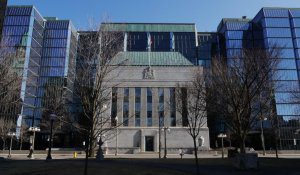 Bank of Canada Governor Stephen Poloz has endorsed monetary policies that have helped to shift productive resources to government spending and housing, writes Philip Cross.
Bank of Canada Governor Stephen Poloz has endorsed monetary policies that have helped to shift productive resources to government spending and housing, writes Philip Cross.
By Philip Cross, June 13, 2019
It is no surprise that of all the former governors of the Bank of Canada, only John Crow had the gravitas and legacy to write a book about his tenure. By comparison, the current governor, Stephen Poloz, whose seven-year term has just entered its final year, barely has accomplishments, never mind a legacy. That is, unless one counts a track record of subpar growth, two near-recessions, monumental bubbles in Canada’s two largest housing markets and a substantial devaluation of the currency. But he did put the face of a female civil-rights activist on the $10 bill.
Poloz began his tenure reasonably well, bringing some normalcy back after the over-excited communications strategy conducted by his predecessor, Mark Carney. A less partisan and self-aggrandizing approach was in the bank’s own interest since Carney’s flirtation with leading the Liberal party was a greater threat to central bank independence than any Donald Trump tweet.
However, things quickly began to sour for Poloz. He hardly distinguished himself as a forecaster when early in his term he speculated that the economy was already shifting from growth based on debt-financed household and government spending to more durable gains in business investment and exports. Four years later, the economy still has not made that transition.
The Bank of Canada’s own research suggests that the ongoing slump in business investment reflects structural impediments such as stagnant productivity, excessive regulation and lower oil prices. Low investment is not due to the cyclical factors Poloz mistakenly blamed it on, since even industries with high capacity utilization are not investing. Slumping business investment is intertwined with persistently weak non-energy exports, which the bank’s analysis attributes to lagging competitiveness and supply constraints, such as transportation bottlenecks and labour shortages.
While poor forecasting based on faulty analysis leaves Poloz in good company, his greatest mistake was endorsing easy-money policies. One of the most famous quotes about central banking is from William Miller, the longest-serving chairman of the U.S. Federal Reserve Board, who said “The job of the Fed is to take away the punch bowl once the party gets started.” Not only did Poloz choose to leave the punch bowl right where it was, he spiked it. He used the oil-price crash early in 2015 to surprise financial markets with lower interest rates, which accelerated the depreciation of the Canadian dollar — it was US$0.98 when he began; it’s around US$0.75 today — as if contradicting market expectations and injecting more uncertainty into economic policy was helpful in some way.
Poloz might defend his actions as no worse than other central bankers of his generation, all of whom adopted record low interest rates, often supplemented by quantitative easing. However, Poloz, more than his peers, knew the risks that ultra easy money posed for long-term economic growth and financial stability.
Early in his career at the Bank of Canada (he became head of its vaunted research department), Poloz was a protégé of deputy governor William White. White went on to become one of the leading exponents of the dangers inherent to the unprecedented monetary stimulus after the Great Financial Crisis. Poloz was intimately aware of White’s arguments but nevertheless ignored them.
Poloz’s public statements never indicated a willingness to withhold monetary stimulus until the federal government adopted structural reforms to boost growth or to even passively inject White’s concerns into the public debate. In fact, by maintaining extraordinary monetary stimulus, central banks like Canada’s reduced the incentive for other policymakers to adopt fiscal and structural reforms, dampening potential growth over the long term. Nor did he anticipate or warn Canadians about the risks of gorging themselves on the very debt that record low interest rates encourage.
Enhanced monetary stimulus reinforced by the Trudeau government’s shift to deficit spending failed to boost economic growth. Just the opposite; real GDP growth since 2015 has averaged slightly less than in the previous decade, while household disposable incomes slowed even more. The idea that such tepid growth is the unavoidable “new normal” in North America is belied by the 3.9-percent gain posted by the U.S. business sector’s portion of American GDP in the past year. Over the same period, the business sector’s GDP in Canada grew by just 0.9 percent. The U.S. experience demonstrates that a judicious mixture of policies both to boost demand and enhance supply (notably deregulation, corporate tax cuts and accelerated depreciation) lifts growth better than an exclusive focus on aggregate demand.
Rather than raising growth, low interest rates encouraged governments, households and firms in Canada to substantially increase their debt loads. This puts them at increased financial risk — the bank’s latest assessment highlights household and corporate debt as two of the greatest threats to financial stability. On Poloz’s watch, asset prices took off, notably for house prices in Toronto and Vancouver, which clearly accelerated when interest rates were cut in 2015. This priced a generation of young people out of these housing markets.
Poloz justifies monetary stimulus on the grounds that the economy strayed far from full capacity, or “home” as he quaintly calls it. In a recent speech, he confidently predicted steering the economy back to “home” co-ordinates by the end of his term after six years of turbulent sailing, like a triumphant Ulysses returning from a long odyssey fraught with dangers. The problem is, home no longer sits where it once was. By regularly doping the economy with policies that shifted productive resources to government spending and housing instead of business investment and exports, home — at least temporarily — has moved to a much poorer neighbourhood.
Philip Cross is a senior fellow at the Macdonald-Laurier Institute.
Image credit: d.neuman via Flickr Commons




